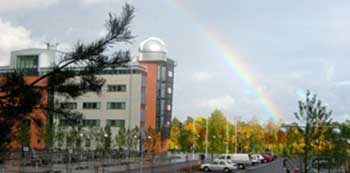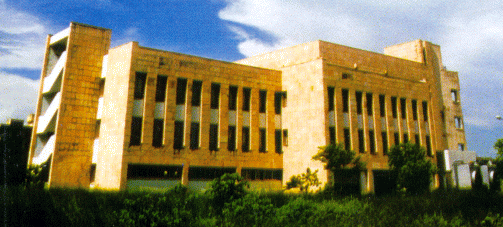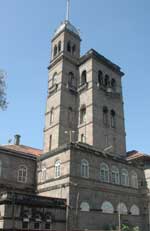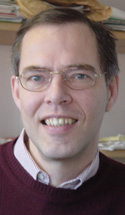SWEDISH SOUTH ASIAN STUDIES NETWORK
Division of Materials Theory, Department of Physics and Astronomy, Uppsala University
 Postal address: Department of Physics and Astronomy,
Postal address: Department of Physics and Astronomy,
Box 530, SE-751 21 Uppsala, Sweden
Visiting address: Ångström Laboratory,
Lägerhyddsvägen
1, Uppsala
Web page: http://www.fysik.uu.se/cmt
Contact persons: Professor Biplab Sanyal , phone +46(0)18 471 3624.
Professor Rajeev Ahuja, phone +46 (0)18 471 36 26
In 2008, the former Theoretical Magnetism Group, and Condensed Matter Theory Group merged into one: The Division of Materials Theory.
The department of Physics and Astronomy was formed in January 2010 by merging the former department of Physics and Astronomy with the department of Physics and Materials Science.
South Asia related research:
The research group is involved in an Indian-Swedish
collaboration project titled ” Theoretical
and experimental investigations on magnetic alloys”.
In November 2005 the project was given SEK 600 000 as a three-years
(2006-08) Swedish Research Links grant by the Swedish Research
Council and Sida. More
information on the Swedish Research Links grants 2005.
Swedish participants in the project:
Professor Olle
Eriksson (principal investigator) and
Professor Biplab Sanyal, Dept. of Physics; and
Professor Per
Nordblad, Solid
State Physics, Department of Engineering Sciences, Uppsala University.
 Principal
investigator on the Indian side is Prof. Abhijit
Mookerjee from the S.
N. Bose National Center for Basic Sciences, Kolkata (photo
to the right). Two colleagues from the same research centre
are also participating in the project, namely Dr. Pratip
Kumar Mukhopadhyay and Dr. Tanusri
Saha-Dasgupta. A fourth Indian research partner is
Dr. Dipankar
Das from the Department of Atomic Energy, UGC-DAE
Consortium for Scientific Research, Kolkata Centre.
Principal
investigator on the Indian side is Prof. Abhijit
Mookerjee from the S.
N. Bose National Center for Basic Sciences, Kolkata (photo
to the right). Two colleagues from the same research centre
are also participating in the project, namely Dr. Pratip
Kumar Mukhopadhyay and Dr. Tanusri
Saha-Dasgupta. A fourth Indian research partner is
Dr. Dipankar
Das from the Department of Atomic Energy, UGC-DAE
Consortium for Scientific Research, Kolkata Centre.
As
part of the project an
Asia-Sweden Research Links conference on Magnetism in Materials is
held in Kolkata, India, 8–10 January 2007. The idea of this
meeting is to present results of current research interests and exchange
ideas between Indian and Swedish researchers for future collaboration. More
information about the Kolkata conference.
Project Abstract: Magnetic
transition metal alloys are extremely interesting from both the
understanding of basic magnetism and applications to technological
advancements. For the last few decades, these alloys have been
studied exhaustively by both theoretical and experimental techniques.
Still there exists a perpetual interest to study them due to the
possibilities of new technological innovations e.g. magnetoelectronics.
Materials, e.g., FePt and CoPt, used in magnetic storage devices,
are indispensable for today’s world.
Within this collaboration, a workshop was held in January 2008 in Kolkata, India jointly organized by S.N. Bose National Center for Basic Sciences, Indian Association for the Cultivation of Sciences, Kolkata and Uppsala University, Sweden. It was titled "Workshop and Conference on Electronic Structure Theory : Methods and Applications". Apart from theoretical talks, computer sessions were organized for hands-on exercises to calculate the properties of materials. Previously in January 2007, another workshop on magnetic materials was held where both theoreticians and experimentalists from Sweden and different parts of India gave lectures and shared their knowledge with younger people. During 2006 to 2008, several visitors (mainly young Ph.D. students) visited the Department of Physics at Uppsala University for several months. Also, senior researchers visited the institutions at the two countries. This collaboration was very successful in terms of scientific publications also.
 In November 2008, Dr. Biplab Sanyal received SEK 600 000
as a three-years research grant for the period 2009–11 from the Swedish Research Links programme (funded by Sida and the Swedish research Council) for a new India related project titled ”Theoretical studies on quantum dots”. The project aims at establishing a concerted theoretical research activity between Uppsala University and the University of Pune, India (photo) with a participation of S. N. Bose National center for Basic Sciences, Kolkata. More information on the Swedish
Research Links grants 2008.
In November 2008, Dr. Biplab Sanyal received SEK 600 000
as a three-years research grant for the period 2009–11 from the Swedish Research Links programme (funded by Sida and the Swedish research Council) for a new India related project titled ”Theoretical studies on quantum dots”. The project aims at establishing a concerted theoretical research activity between Uppsala University and the University of Pune, India (photo) with a participation of S. N. Bose National center for Basic Sciences, Kolkata. More information on the Swedish
Research Links grants 2008. ![]()
The main collaboration partner on the Indian side is
Prof. Dilip Kanhere from the Dept. of Physics, University of Pune.
Swedish co-applicants are
Prof. Olle Eriksson, Dr. Susanne Mirbt, and Dr. Jonas Fransson, all at Uppsala University. Indian co-applicants are Prof. Abhijit Mookerjee, S. N. Bose National Center for Basic Sciences, Kolkata;
Associate Prof. Anjali Kshirsagar, Dept. of Physics, University of Pune; and
Dr. Kavita Joshi, also from the Dept. of Physics, University of Pune.
Project abstract: The project deals with the theoretical studies of the physical properties of Quantum Dots, the entities, which are vital for nanotechnological applications. The aim is to study the electronic, structural, magnetic and transport properties of these nano-scale entities by accurate first-principles density functional calculations, many body exact configuration interaction and formalism of equilibrium and non-equilibrium electron transport. The participation of Swedish and Indian researchers of various complementary expertises carries a unique feature of the present constellation. The collaboration will be set by exchange visits, organization of workshops and schools for training and education of young researchers and exchange of softwares between the research groups. The outcome of this project will be the knowledge base and understanding of the physics of realistic materials-specific Quantum Dots, which will help the experimentalists to grow and characterize these nano-scale entities.
 Professor Rajeev
Ahuja (photo) is connected to a research project on ”Novel
Multifunctional Oxide Sensor materials for Monitoring Environment” led
by Prof. K.V. Rao at the Division
of Engineering Material Physics, Dept. of Materials Science and
Engineering, Royal Institute of Technology (KTH), Stockholm.
More information on this project.
Professor Rajeev
Ahuja (photo) is connected to a research project on ”Novel
Multifunctional Oxide Sensor materials for Monitoring Environment” led
by Prof. K.V. Rao at the Division
of Engineering Material Physics, Dept. of Materials Science and
Engineering, Royal Institute of Technology (KTH), Stockholm.
More information on this project. ![]()
In November 2006, Associate Professor Lars
Nordström received SEK 600 000 as a three-years
(2007-09) Swedish Research Links grant (provided by Sida/SAREC
and the Swedish Research Council) for a research project titled
”A joint theoretical and experimental
study of diluted magnetic semiconductors”. The project
will be carried out in collaboration with the Indian Institute
of Technology (IIT) in Mumbai, India. The main collaboration partners
are Associate Prof. Indra
Dasgupta and Associate Prof. K. G.
Suresh.
Besides Dr. Nordström, the Uppsala University research
team consists of Prof. Biplab Sanyal (see information above); Associate
Prof. Olof Karis, Surface
Physics Group; and Professor Peter Svedlindh, Dept. of Engineering
Sciences.
More information about the 2006 Swedish
Research Links grants related to South Asia.
Project abstract: The field of spintronics has opened up a new dimension in information technology, not only enhancing established microelectronics concepts by introducing magnetic functionality, but also by providing exciting opportunities for completely new device ideas. In the modern technology, information is carried by charge currents, localized magnetic moments are used for storing data, and light beams are used for information transmission. But there is a growing recognition that devices exploiting spins of electrons can be used as information carriers, so-called spintronic devices, can exhibit performance superior to conventional electronic devices. The advantages of these new devices would be nonvolatility, increased data processing speed, decreased electric power consumption, and increased integration densities compared with conventional semiconductor devices. Diluted magnetic semiconductors (DMS) are essential ingredients for semiconductor spintronics, which combines the charge and spin degrees of freedom of electrons to manipulate the properties of the traditional charge-controlled semiconductor devices. Despite extensive experimental and theoretical research, the fundamental understanding of these systems is far from being complete. A microscopic understanding is necessary to characterize and manipulate the properties and to design new materials with novel characteristics. This proposal aims to build up a concerted theoretical and experimental activity on important materials, e.g., Co doped ZnO and other oxide DMS as well as transition metal doped Heusler and half-Heusler materials. The theoretical approach will be based on ab initio electronic structure calculations and the experimental research will include sample preparations, structural and magnetic characterizations using XRD, SQUID, XAS and XMCD measurements.
In November 2007, Dr. Rajeev Ahuja received SEK 450 000 as a three-years
(2008-10) Swedish Research Links grant (provided by Sida/SAREC
and the Swedish Research Council) for a research project titled
”Light metal hydrides as Hydrogen Storage Materials for Environmental Friendly Applications”. The project
will be carried out in collaboration with the Physics Department at Banaras Hindu University in Varanasi, India. The main collaboration partner is Prof. O.N.Srivastava.
More information about the 2007 Swedish
Research Links grants related to South Asia.
Project abstract: Our energy-hungry world has become increasingly depending on new methods to store and convert energy for new, environmentally friendly modes of transportation and electrical energy generation as well as for portable electronics . Mobility – the transport of people and goods – is a socioeconomic reality that will surely increase in the coming years. It should be safe, economic and reasonably clean. Hydrogen would be ideal as a synthetic fuel because it is lightweight, highly abundant and its oxidation product (water) is environmentally benign. However, the storage remains a problem for this highly desirable development. Here we present a proposal where we focus on the search for innovative materials with high hydrogen-storage capacity. We propose to perform theoretical and experimental studies of such materials, with the purpose toidentify and improve the most important materials parameters. From the gained knowledge, we will invent materials which will enable improved devices and constructions. Hence we propose to focus new activities in the study of materials of significance in energy applications. This type of research have national importance for any country and they address two of the critical issues for a new hydrogen economy.
 In December 2009, Prof. Peter Oppeneer (photo) received SEK 730 000 as a three-year International Collaborative Research Grant from the Swedish Research Links programme (funded by Sida and the Swedish Research Council) for a India related project entitled ”Magnetism in organic materials”. See the full list of South Asia related projects given Swedish Research Links grants 2009.
In December 2009, Prof. Peter Oppeneer (photo) received SEK 730 000 as a three-year International Collaborative Research Grant from the Swedish Research Links programme (funded by Sida and the Swedish Research Council) for a India related project entitled ”Magnetism in organic materials”. See the full list of South Asia related projects given Swedish Research Links grants 2009. ![]()
The research project will be carried out in collaboration with Dr. Tanusri
Saha-Dasgupta, S.N. Bose National Centre for Basic Sciences, in Kolkata.
Project abstract: The topic of the research collaboration is the theoretical investigation of magnetism in organic materials, using large-scale quantum-chemical computer simulations. Both groups have a proven record in computational theory of magnetism in organometallic materials, yet focusing thus far on complementary aspects. The Indian group studies spin-crossover phenomena in spin-transition polymers, whereas the Swedish group studies the magnetic properties of bio-molecules adsorbed on metallic surfaces. Magnetic phenomena in organometallic molecules hold potential for applications in data storage, optical switches or magnetic detectors, and molecular spintronics devices. It is the aim of collaborative project to bring these two groups together, to stimulate the interactions between the two groups, and thus fertilize the connections between India and Sweden. Within the research program this aim will be pursued through mutual research visits, scientific collaboration and joint workshops.
Another researcher within the same department, Prof. Olle Eriksson, also received a three-year International Collaborative Research Grant from the Swedish Research Links programme in December 2009. Prof. Eriksson received SEK 710 000 for a research project entitled ”Dynamics of correlated electron systems”. See the full list of South Asia related projects given Swedish Research Links grants 2009. ![]()
It will be carried out in collaboration with Prof. Dipankar
Das Sarma, Solid State and Structural Chemistry Unit, Indian Institute of Science (IISc) in Bangalore.
SASNET - Swedish South Asian
Studies Network/Lund University
Address: Scheelevägen 15 D, SE-223 70 Lund, Sweden
Phone: +46 46 222 73 40
Webmaster: Lars Eklund
Last updated
2011-03-25
